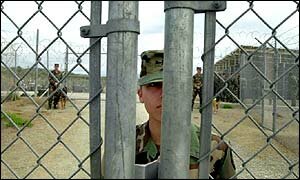|
By GINA HOLLAND, Associated Press Writer - Thu Jul 8, 2:29 AM ET
 WASHINGTON - The Supreme Court ruled last week that the nearly 600 men from 42 countries being held at the U.S. naval prison at Guantanamo Bay, Cuba, may use American courts to challenge their detentions. WASHINGTON - The Supreme Court ruled last week that the nearly 600 men from 42 countries being held at the U.S. naval prison at Guantanamo Bay, Cuba, may use American courts to challenge their detentions.
The decision prompted a flood of lawsuits on behalf of the prisoners and forced the government to reconsider one of its primary anti-terrorism tactics. U.S. officials said Wednesday the military will begin reviewing the individual cases of the detainees to determine whether they are legally held.
Here, in question and answer form, is a look at the Guantanamo situation:
Q: What happens now?
A: The first lawsuits seeking release of individual detainees were filed last week in federal court in Washington. More are expected. The New York-based Center for Constitutional Rights is representing dozens of inmates. Private law firms and law professors are also helping with cases free of charge.
The first round of litigation involves challenges for two British citizens, three French citizens, a German Turk, a Jordanian Palestinian refugee, an Iraqi refugee and a Canadian.
Q: What type of legal challenges are they?
A: The lawyers filed petitions known as habeas corpus, in which courts decide whether someone's imprisonment is legal. Attorneys for the detainees argue that the government exceeded its constitutional authority by holding the men without charges. Most of the detainees were captured on the battlefield in Afghanistan; many have been held for more than two years.
The administration had contended that the detainees are enemy combatants, an indistinct legal term. Enemy combatants, the administration said, are neither prisoners of war protected by the Geneva Conventions nor ordinary criminal suspects with automatic rights to see a lawyer and know the charges against them.
Q: What is the government doing in response to the ruling?
A: The Pentagon (news - web sites) said Wednesday that within 10 days, the 595 Guantanamo prisoners will be informed of their new rights — including details of the Supreme Court decision that they may go before a federal judge. Each detainee's case will be reviewed by a panel of three officers, which the Bush administration believes will bolster its defense in federal court lawsuits. If a review determines a prisoner is not a lawfully held combatant, he will be released to his home country.
Q: What other issues does the government have to address?
A: One problem is a logistical one. The government brought the detainees to the out-of-the-way location of Cuba, away from lawyers and family members, and argued that federal courts did not have jurisdiction there. The Supreme Court disagreed, and now there is a practical problem of getting lawyers to Cuba to meet with the inmates, and potentially transferring detainees as well as their witnesses to Washington for court hearings. Human rights groups are pressing for the names of all the detainees, which the government has kept secret.
Q: How long will it take for judges to decide whether any detainees should be released?
A: It could be a matter of months. But as the government reviews individual cases, detainees may be released before a judge orders it.
U.S. District Judge Colleen Kollar-Kotelly is overseeing the case that went to the Supreme Court, filed on behalf of detainees in 2002. She seemed skeptical of the detentions, noting in a July 2002 opinion that "the notion that these aliens could be held incommunicado from the rest of the world would appear to be inaccurate." However, the judge said she did not have the power to decide that issue. The Supreme Court ruled that federal judges can consider whether detentions are unlawful.
Q: What about the detainees who are facing charges?
A: Only three of the nearly 600 inmates have been charged: David Hicks of Australia, Ali Hamza Ahmad Sulayman al Bahlul of Yemen and Ibrahim Ahmed Mahmoud al Qosi of Sudan. President Bush (news - web sites) has said 12 other prisoners are subject to military tribunals. A five-member tribunal will hear the cases, the first such trials in nearly 60 years. Military tribunals are reserved for foreign-born captives, and defendants do not have the same rights that they would in American civilian courts. Human rights lawyers are also challenging plans for military tribunals.
|